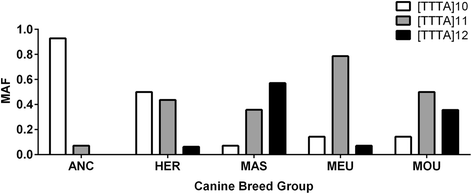Polymorphisms in the canine monoamine oxidase a (MAOA) gene: identification and variation among five broad dog breed groups
- PMID: 28101368
- PMCID: PMC5237129
- DOI: 10.1186/s40575-016-0040-2
Polymorphisms in the canine monoamine oxidase a (MAOA) gene: identification and variation among five broad dog breed groups
Abstract
Background: In humans, reduced activity of the enzyme monoamine oxidase type A (MAOA) due to genetic polymorphisms within the MAOA gene leads to increased brain neurotransmitter levels associated with aggression. In order to study MAOA genetic diversity in dogs, we designed a preliminary study whose objectives were to identify novel alleles in functionally important regions of the canine MAOA gene, and to investigate whether the frequencies of these polymorphisms varied between five broad breed groups (ancient, herding, mastiff, modern European, and mountain). Fifty dogs representing these five breed groups were sequenced.
Results: A total of eleven polymorphisms were found. Seven were single nucleotide polymorphisms (SNPs; two exonic, two intronic and three in the promoter), while four were repeat intronic variations. The most polymorphic loci were repeat regions in introns 1, 2 (7 alleles) and 10 (3 alleles), while the exonic and the promoter regions were highly conserved. Comparison of the allele frequencies of certain microsatellite polymorphisms among the breed groups indicated a decreasing or increasing trend in the number of repeats at different microsatellite loci, as well as the highest genetic diversity for the ancient breeds and the lowest for the most recent mountain breeds, perhaps attributable to canine domestication and recent breed formation. While a specific promoter SNP (-212A > G) is rare in the dog, it is the major allele in wolves. Replacement of this ancestral allele in domestic dogs may lead to the deletion of heat shock factor binding sites on the MAOA promoter.
Conclusions: Dogs exhibit significant variation in certain intronic regions of the MAOA gene, while the coding and promoter regions are well-conserved. Distinct genetic differences were observed between breed groups. Further studies are now required to establish whether such polymorphisms are associated in any way with MAOA level and canine behaviour including aggression.
Keywords: Aggression; Breed difference; Canine; MAOA; Polymorphism.
Figures



Similar articles
-
Single nucleotide polymorphisms and microsatellites in the canine glutathione S-transferase pi 1 (GSTP1) gene promoter.Canine Genet Epidemiol. 2017 Oct 11;4:9. doi: 10.1186/s40575-017-0050-8. eCollection 2017. Canine Genet Epidemiol. 2017. PMID: 29046813 Free PMC article.
-
Association of DNA methylation and monoamine oxidase A gene expression in the brains of different dog breeds.Gene. 2016 Apr 15;580(2):177-182. doi: 10.1016/j.gene.2016.01.022. Epub 2016 Jan 16. Gene. 2016. PMID: 26784655
-
Analysis of the monoamine oxidase A (MAOA) gene in bipolar affective disorder by association studies, meta-analyses, and sequencing of the promoter.Am J Med Genet. 1999 Aug 20;88(4):398-406. Am J Med Genet. 1999. PMID: 10402508
-
Forensic DNA phenotyping: Canis familiaris breed classification and skeletal phenotype prediction using functionally significant skeletal SNPs and indels.Anim Genet. 2022 Jun;53(3):247-263. doi: 10.1111/age.13165. Epub 2021 Dec 28. Anim Genet. 2022. PMID: 34963196 Review.
-
Single nucleotide polymorphisms, variable number tandem repeats and allele influence on serotonergic enzyme modulators for aggressive and suicidal behaviors: A review.Pharmacol Biochem Behav. 2019 May;180:74-82. doi: 10.1016/j.pbb.2019.03.008. Epub 2019 Mar 27. Pharmacol Biochem Behav. 2019. PMID: 30928299 Review.
Cited by
-
Genetic distance from wolves affects family dogs' reactions towards howls.Commun Biol. 2023 Feb 6;6(1):129. doi: 10.1038/s42003-023-04450-9. Commun Biol. 2023. PMID: 36747107 Free PMC article.
References
LinkOut - more resources
Full Text Sources
Other Literature Sources
Molecular Biology Databases

